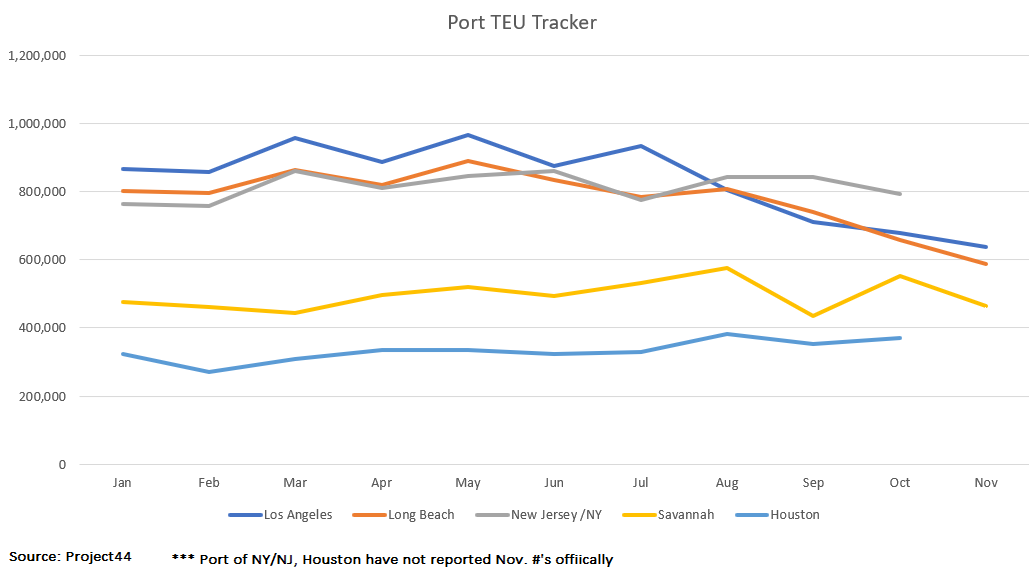If you think the “Roaring ’20s” have been a dud, you clearly don’t work in logistics.
This decade has been defined by several years of gluttonous spending, trade routes busting at the seams, supply chain delays, disruptions and obscene logistics prices. If this decadence of doom doesn’t say “roaring,” nothing will.
But is the roar now transforming into a purr?
Just like all prior maritime boom cycles, things start to turn down. Trade hasn’t fallen off a cliff — it’s just a slimmer version.
Ocean carriers are cinching their girdles for a leaner 2023 with blank sailings. Between Dec. 12 and Jan. 15, 100 sailings have been canceled across the major trade lanes, according to Drewry’s Canceled Sailings Tracker. The reshaping of trade is creating a misleading message on demand.
“YML Taiwan is even looking for 100% load factor for the next two weeks,” Joe Monaghan, CEO of Worldwide Logistics Group, told American Shipper. “Although we don’t see an increase in the booking, the space is getting tight as the carriers are cutting the supply.”But lean doesn’t mean below 2019 levels. The consumer is stronger than pre-pandemic, the only difference is they are no longer juiced up with all that stimulus spending.

The wringing of the hands is not warranted.
But when you start to read stories on the health of the consumer post-holiday season, you will need to review the earnings calls of the logistics companies. These will provide critical information on consumer spending — not the retailers. Why? Because logistics companies are paid by the units of freight they move, not the price it is sold at.
“Retailers will have to discount,” said Kraig Foreman, DHL Supply Chain’s president of e-commerce. “This holiday season, we are seeing volume across all customer levels and we expect a similar volume in sales as we saw last year.”
Units sold will tell the story. Don’t be fooled by them.
The flow of trade this year has also been skewed by the front-loading of holiday products that began in the spring. Artificial trees coming into the Port of New York and New Jersey were just some of the items arriving early. Retailers continue to whittle down their inventories.

Voluptuous trade
The volume processed at the East and Gulf coast ports has grown exponentially throughout the pandemic, further extenuating the shape of trade. The messaging from the port directors on the two coasts telegraphs that reality.
Rick Cotton, executive director of the Port Authority of New York and New Jersey, told American Shipper he is confident his facility’s gains will be lasting, especially after five years of investments.
“If you compare today’s performance to prior years, it has absolutely stayed at an extraordinary level above the prior years,” Cotton said. “We are not seeing the decline the other ports are seeing. The port will continue to set records for the rest of the year and we think that trend will continue. There may be seasonal declines, but the port is hitting on all cylinders.”
Cotton also said the port would rank No. 1 in the nation for a fourth straight month in processing containers.
On the flip side, you have the situation at the Port of Los Angeles.
“In the months ahead, we’re going to have to work harder and smarter to earn cargo back,” said Gene Seroka, the facility’s executive director. “Every ship, every train, every truck needs to be handled with the top-level service our customers expect and deserve.”
So no matter how much you read from the keyboard warriors pounding their chests about trade going back to the West Coast, just let them pound away. Trade will not go back to “normal.” Why? Because its history shows that with each occurrence of labor strife on the West Coast, trade has been lost.

Trade is sticky. Trade is not rocket science. Trade is created, managed and facilitated by people.
So, until the bloat of inventories is worked off, the girdle is on.











